Jason Anderson and Rob Bradley are energy specialists at Climate Network Europe in Brussels. CNE is the European node of the Climate Action Network, which unites nongovernmental organizations working on domestic and international climate change issues.
Monday, 5 Nov 2001
MARRAKECH, Morocco

Jason Anderson
After a week at the 7th Conference of Parties to the United Nations Convention on Climate Change (known as COP-7), the familiar rhythm of the COPs has been established. An interminable NGO strategy session the first Sunday, a Monday that seems to last a week as we get back into the issues, and then a blur of nearly round-the-clock activity that culminates in the NGO party on Saturday night.
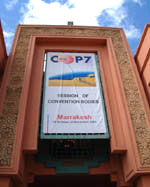
We’ve got high hopes.
Photo: Climate Network Europe.
It may come as a surprise that the best attended, and I suspect most anticipated, event of a UN conference involves booze, dancing, and hangovers. But by the end of a week where the hottest publication in town was “Modalities for the accounting of assigned amounts under article 7.4,” you’d want to kill some brain cells, too.
With the implosion of the talks at The Hague and the agreement in Bonn now behind us, COP-7 has a decidedly different flavor from its earlier incarnations. Absent are the troops of Greenpeace volunteers in identical red caps, or the gaggles of press waiting for scraps of news to fall from the negotiating tables. Now we’re back to the details that make up the guts of the climate change talks. Working groups convene until late in the night to discuss topics known by their numbers: 5, 7, and 7.4. Eight, 3.3, and 3.4. Around here, if you don’t know what they mean, you’re not part of the club and don’t get to play.
The abstruseness of the subject matter stands in stark contrast to the public understanding of this issue: Things are getting hotter, which is bad. That’s a pretty basic formulation, but it’s accurate. Bridging the gap between this fundamental problem and the numerical muddle at the COP is a primary task of NGOs, who are here in legion.
Most NGOs here are grouped in an umbrella organization called the Climate Action Network (CAN). Big international NGOs like Greenpeace and WWF send large delegations that meet internally, cover all the issues, and have their own press officers. But they participate equally with the many smaller organizations in CAN for general coordination of information and strategy. There’s a real sense of cooperation and camaraderie that motivates the work, and over the years people have formed close friendships while developing more and more expertise. Procedures, while not formally established, have become fixed by tradition: daily hour-long strategy sessions at 2 p.m., working groups on specific issues, and late nights producing the daily newsletter, Eco. In between this: following negotiations, preparing bullet points for delegates, and lobbying.
One of CAN’s main focuses at this conference has been a natural one for NGOs: public participation. Our very presence here is an example of it in action. Rather than occurring behind closed doors, the negotiations are open to observers who can watch the sessions, share information with the rest of the world, and lobby delegates in the corridors. Many of the structures that this conference will establish will also have a component of public participation — occasionally to the chagrin of some governments. Last week, Russian delegates tried to change the rules on enforcement of the Protocol to keep the outside world from knowing about investigations of wrongdoing until after they’re done. This earned them the “fossil of the day award,” a surprisingly effective public shaming of climate bad guys.
The main reason that public participation has become so important is the inclusion of forestry projects in developing countries as a means of earning carbon reduction credits. Long fought by NGOs, the EU, and others as a massive carbon loophole, such projects also run the risk of harming local populations. It is conceivable, depending on how further rules develop, that an indigenous group could be run off their land, the forest destroyed with herbicide and replanted with a monocrop of exotic eucalyptus trees, all to allow some coal-fired power plant in Scranton to keep pumping out CO2. Giving local populations a voice, getting them and international groups information to fight back, and helping to prevent this kind of project are keys to limiting the damage and redirecting resources to sound projects.
Some important concerns have been taken on board, but the gulf between people “on the ground” and delegates in the rarified atmosphere of the COP can mean that even sympathetic parties can seem obtuse. On Saturday, European NGOs met with the head of European delegations. On this occasion a representative of indigenous people came as well, to present an impassioned plea for special status for indigenous observers in the climate change talks. As residents of earth’s most fragile environments on the front lines of climate change, they should represent the conscience of the negotiations. In this case, the representative was told that his proposal was misplaced because it wasn’t a SBSTA issue and therefore not appropriate for insertion in decision text FCCC/CP/2001/10. Perhaps he should have numbered his proposal to attract more attention.
Tuesday, 6 Nov 2001
MARRAKECH, Morocco

Rob Bradley
I wanted Grist readers to be the first to know that the issue of fungibility and the debate between advocates of dynamic assigned amount and those espousing a fixed version under Article 7.4 (with its obvious implications for transferability of CERs and the banking of LULUCF credits arising from 3.3 and 3.4 activities) has now been clarified by the submission of proposals from the E.U., the Umbrella Group, and the G77, consolidated in FCCC/CP/2001/MISC8 and used to modify FCCC/CP/2001/2/Add.4 to produce a non-paper.
Exciting stuff, eh? Grist readers, it goes without saying, are the creme de la creme of the human intellect, but imagine for a minute trying to explain all of the above to regular mortals.
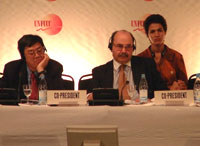
COP-ing a nap.
Photo: Climate Network Europe.
The Kyoto Protocol could have been very simple: industrialized countries that are belching out greenhouse gases in excessive volumes agree to curtail these emissions to mitigate dangerous climate change. However, adventurous negotiators felt that this was far too straightforward for an international treaty — and anyway, if that kind of clarity prevailed they would soon be out of a job. So all sorts of complex mechanisms and procedures were added to allow (on the positive side) some cheaper reduction options and (on the not-so-positive side) obscure loopholes in the agreement. Those, plus some safety provisions inserted as a frantic rearguard action by some of the more environmentally-minded countries, have made the whole thing a mess. Add the obsession of some Parties with sinks (parts of the world that magically absorb carbon dioxide emissions; currently more voodoo than science) and things get totally chaotic.
Meanwhile, we NGOs have our own informat
ion gaps to deal with. CAN (the Climate Action Network) includes some 330 environmental organizations across the world, and a correspondingly wide range of interests and expertise. Take for example the Moroccan NGOs. Awareness in Marrakech of climate change as an issue is impressively high; taxi drivers and market hawkers here seem to have a better grasp of the essentials of climate science than some U.S. delegates. RAC Maghreb, a North African branch of CAN, was set up this year by NGOs from the region that want to play a larger role in the debates taking place in Marrakech. They have made impressive progress already — even producing an Arabic language newsletter every night. Yet with the issues already so detailed that even seasoned campaigners are struggling, and with CAN as a whole operating in English, they are finding the process very frustrating. The previous climate change meetings, with their high media profile, included huge public demonstrations such as the building of a dyke in The Hague and the construction of a gigantic wooden Ark in Bonn — the kinds of projects where everyone could get involved. Here, with much of the media absent, there are no such opportunities to get involved in these more inclusive activities.
Not only NGOs have this problem. The lack of understanding of the issues and the procedures is obvious in many delegations. Delegates from many countries wander around with slightly lost looks on their faces, as they are lobbied to accept strange formulae on commitment period reserves, or allow “shall” to be changed to “should” in legal texts.
Ironically, some of the discussions they are failing to grasp are about the need to provide timely and useful information to the public, so that everyone can wrestle with the indecipherable Kyoto procedures. But is providing information enough in itself? Putting the facts and figures on a website may look like public distribution, but it won’t be much help to most Africans who want to know whether a project may destroy their homes. There has been some attempt to make the media of distribution more explicit. A Russian delegate at one point suggested that the CDM Executive Board should make its documents available on television — which may be a statement about the quality of Russian daytime programming rather than a genuine demand for international networks to get involved.
There’s not a lot of talk about biodiversity in Marrakech, but all this internal complexity has given rise to bizarre ecosystems of COP hangers-on. While delegates argue about how and whether companies can trade emissions under the Kyoto Protocol, groups such as the International Emission Trading Association excitedly bang the drum for the business opportunities that may or may not be emerging from the talks. For instance, business people again and again stress that a strong compliance system is a fundamental necessity for workable flexible mechanisms such as emission trading. At the same time, allegedly business-friendly delegations such as those from Canada and Australia are precisely the ones watering down the compliance provisions to the point of meaninglessness, thus undermining these nascent markets.
To many business lobbyists, this is a forum in which to either pursue domestic agendas or do general schmoozing. Meanwhile, eager PhD students writing theses on “negotiations, complexity, and general weirdness in a society out of its mind” look around in wide-eyed wonder at the richness of the research material here.
If things weren’t already hectic, Ministers have just arrived and are being frantically briefed by their staff. At least after the traumas of the Hague and Bonn most have a much better understanding of the issues. We met this morning with Olivier Deleuze, who is Belgium’s energy and sustainable development minister, and therefore currently in charge of the European Union delegation under its rotating presidency. He was impressively well-informed about the issues. There have been some nefarious attempts by the technical experts of the Umbrella Group (Australia, Canada, Japan, and Russia) to renege on the deal made in Bonn by gutting any hint of binding rules. But ministers who stayed up all night to negotiate those rules are in no mood to reopen that discussion, and the E.U. looks solid.
Mind you, Deleuze has had good schooling. While many other countries send representatives of business interests or bureaucrats with little real interest in the issues, the E.U. has an ex-Greenpeace man in the drivers seat.
Wednesday, 7 Nov 2001
MARRAKECH, Morocco

Jason Anderson
Good news for the nostalgic: The Russians are bad guys again.
For the Kyoto Protocol to enter into force, Russia must ratify it. In theory, the Russians should be eager to do so, because they stand to make wads of cash. When Kyoto was negotiated in 1997, Russia was asked to reduce its greenhouse gas emissions to 1990 levels, even though its economy had nose-dived since then and emissions were already down by 30 percent. This gave Russia a massive free gift of carbon credits (which NGOs promptly dubbed “hot air”) to sell on the emissions trading market — up to a billion tons of them.
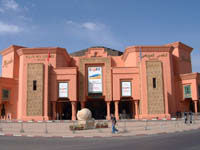
Not much doing outside the conference.
Photo: Rob Bradley.
Going into Bonn, the international spotlight was on troublesome Japan, which must also ratify for Kyoto to take effect. Everyone assumed the Russians would play ball to get their money. But as it turns out, they have been belligerent on nearly every detail. Their positions often left other delegates scratching their heads. Wasn’t this already a done deal? How did they calculate this? Do they have any idea what they’re talking about?
Caught by surprise and recognizing the danger, the EU adopted a strategy of constant bilateral meetings just to keep the bulls from bumbling around in the china shop. One of the big stumbling blocks for the Russian delegation was (no surprise here) forestry sinks. In order to secure agreement in Bonn, delegates negotiated a kind of payoff in the form of credit for forestry activities — for the most part, activities that would happen with or without the Kyoto Protocol. The most troublesome countries with tougher emissions targets got the best deals. Russia is heavily forested so it got the biggest allotment, but that allotment is proportionally below those of some other countries. Given that they don’t need any extra credit to meet their targets — quite the opposite — the deal seemed amazingly generous, but still the Russians left Bonn grumbling. Between Bonn and Marrakech, Russia officially demanded nearly double the allotment written into the Bonn agreement. This demand was based on a new and improved “science-based approach” that went roughly like this: 1) estimate the mass of a tree; 2) multiply by the number of trees in Russia; 3) voila!
Anything that ministers have actually agreed to in previous climate change negotiations is so rare it’s sacrosanct. Articles from the Kyoto Protocol are cited in quavering voices, like scripture. So reconsidering a number in the Bonn agreement could cause immense discord, and Russia knows it.
It may not be an accident that Russia is being just plain obstructionist. There are good indications that the agency heading the delegation, the meteorology service Roshydromet, would prefer not to see a deal emerge — not due to disagreement over content, but to protect its position of authority over the climate issue at home. Should an agreement emerge, the ministry of economic affairs would most likely take the lead role in implementation. After enjoying years of conferences in exotic locations and almost
complete power over climate budgets at home, Roshydromet may be willing to sell the global climate down the river to protect its turf.
Perhaps this sheds light on the statements made to a Russian business and industry conference just three weeks ago by a Roshydromet official, Mr. Potapov. The goals of Roshydromet in Marrakesh, he declared, would include: addition of yet more free credit for Russian reductions between 2000 and 2008 (super hot air), an immediate start to emissions trading even though there’s no system yet to account for its impact on targets (kind of like being allowed to cash checks when not even the bank knows your balance), and inclusion of nuclear energy among the projects in developing countries (which was rejected for good in Bonn).
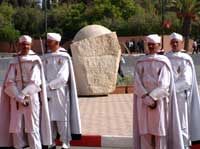
Keeping the delegates in line.
Photo: Rob Bradley.
At the eleventh hour and with most deals done, none of these concepts has a snowball’s chance in hell of being considered in Marrakech. The only conclusion I can draw is that Mr. Potapov either 1) has an unusual sense of humor; 2) recently returned from a Russian space capsule and is a bit behind the times; or 3) aims to cause trouble. Actually, a Russian NGO suggested a fourth option: Even though Mr. Potapov is the second in command of the Russian agency that has full responsibility in the climate negotiations, and even though he was making an important public statement to an international audience on the eve of COP-7 — maybe his remarks were just personal musings.
That this explanation is considered plausible sheds some light on why other delegations tend to find meeting with Roshydomet’s boss, Mr. Bedritsky, about as fun as passing a kidney stone. Poorly briefed, complaining about translation, insisting on points that will never be accepted, contradicting official positions — it gets old. The irony is that Bedritsky comes from a country where people read Pushkin on the toilet; it’s not like Russia lacks the intellectual capacity to participate effectively. But as the climate negotiations have gotten more complex and have moved away from just meteorology, Roshydromet has found itself out of its league, and is fighting to hang on. Competence in the Russian delegation, and there’s plenty around, can’t get the upper hand.
In a super-hierarchy like Russia, the word of the president should be all it takes to get something done. In October, President Putin declared that he wanted to see Kyoto move toward ratification, which can only happen with agreement in Marrakech. Yesterday, citing the discrepancy between this position and the attitude displayed here, we wrote an open letter to President Putin and published it in our daily news brief ECO. The Russians NGOs translated it and sent it to government officials in Moscow. Last night the chairman of the environment committee of the Russian Parliament wrote to the delegation asking for clarification, due by 9 a.m. The delegation was spotted looking a bit nervous this morning. Could it be that public participation works? We’ve been saying it all along.
Thursday, 8 Nov 2001
MARRAKECH, Morocco

Rob Bradley
The schedule here is cruel. We’re up most of the night producing newsletters and pestering negotiators, but when we drag our sorry carcasses to breakfast, journalists are already desperately fishing for quotes about what’s happening. This need to be coherent so early in the day seems brutal.
Given that for the average journalist the stuff we’re talking about does not even approach the comprehensible, many reporters are looking for a more accessible angle on the talks. Most have chosen to focus on business activities in some form or another, and (true to form) the business lobbies are out in force. We NGOs get interviewed in the hope that we will spurt out some rabid quotes about the evil of the profit motive. But in fact what we mostly say is how surprised we are at the absolute divide here between the business world’s perspective and the actual negotiations.
Amazingly, even at this late stage in the proceedings, new arguments have arisen that could seriously reduce the interests of the Kyoto markets for business. The arcane world of Article 7.4, as it is affectionately known to the cognoscenti, deals with the question of whether credits arising from the project mechanisms (Joint Implementation and the Clean Development Mechanism) can be freely traded among industrialized countries, or carried over into future commitment periods. Serious players — especially India and China — are opposing the transfer of CDM credits, which is one of the main areas of interest from the point of view of industry participants. They might still get this restriction. Yet the business reps here still chatter excitedly about the possibilities that lie before them, happily unaware of potential impending doom.
Nor is this the only source of worry. If businesses here had their eye a little more on the ball, they would see a host of other ways in which their potential markets are being undermined.
The number one hot topic, of course, is the withdrawal of the United States from the Protocol. Oddly, most economic analyses show the U.S. as having some of the lowest cost opportunities for making emission reductions, so one might expect the country to be a net seller of emission credits. But the political resistance in the U.S. to making emission cuts was so great that it was always expected to be the major buyer in an international carbon market, at least initially. The absence of this buyer has left the potential market for credits greatly reduced.
Second, the insistence of several countries that they should have as many ways as possible to avoid emission cuts has led to a gross oversupply of credits. On top of the famous “hot air” (see yesterday’s diary for more on that), very generous provisions for claiming sinks credits have been made. Flooding the markets with these basically free credits will further cause prices to plummet. Thus the scope of CDM to reward real clean investment seems to be rapidly undermined.
Last, weak compliance kills flexible mechanisms. One point that the U.S. delegation always understood was that the emission trading system they valued so highly needed clear and strong consequences for non-compliance in order to work effectively. Sadly, their Umbrella Group partners do not seem to understand this quite so well, and have worked busily to undermine the compliance agreement. The details are, needless to say, arcane, but in a nutshell, weak compliance could leave business facing as much uncertainty as ever.
The gap between negotiators and business on these issues was made clear yesterday by an Australian radio interview with Greg Bourne, the head of South Asian operations for the international oil company BP. Calling on countries to ratify the Kyoto Protocol, Bourne stated what is obvious to most but strangely hard for some business leaders to understand: that climate change is real; that action at some time is inevitable. It follows that the sooner we get the right signals to the private sector, the more businesses will be able to make intelligent investment decisions and find lasting solutions to climate change.
Friday, 9 Nov 2001
MARRAKECH, Morocco
The irony of the climate change negotiations is that the crucial ministerial conclaves in the final two days may be crunch time for the environment, but for most delegates and observers it’s what one veteran around here calls “going down to the pub time.”
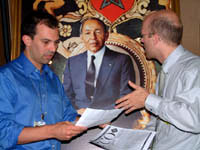
Searching for something to do, Jason and Rob lobby a portrait of the late King of Morocco.
Photo: Climate Network Europe.
It’s true that some people remain at the ready: a few high-powered NGO lobbyists whose opinions are trusted by ministers, for example, and a crack team of specialized lawyers and techies who parachute into terminological fixes to get delegates out of jams. But come 10 p.m. last night, most people settled into the restaurant next to the conference center to swap gossip and sample the local malted beverages. By 1 a.m., with no deal surfacing, it seemed sensible to retire to ECO for the final tirade of the fortnight.
We’ve been burned by expectations of imminent deals before. Last year in The Hague, NGOs set up a round-the-clock vigil, with ministers holed up in a back room to finalize a package. As dawn broke, so did the talks. John Prescott of the U.K. stormed out, scattering exhausted press and lobbyists in his wake. Later, he blamed the failure on the fatigue of the French minister Dominique Voynet, who promptly retorted by calling him a chauvinist pig.
In Bonn, the deciding plenary was announced for 10 p.m., then midnight, then 2 a.m., then TBA. Delegates passed out on sofas, under tables, on rows of chairs, sleeping with one eye open for the return of the negotiators. When the triumphant ministers finally reconvened around noon, the few sensible souls who had gone home for a good night’s sleep were the object of secret envy.
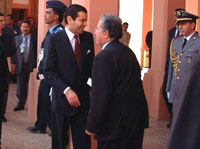
Can you tell me the way to the little boy’s room?
Photo: Climate Network Europe.
This morning, the crowd milling around the conference center had the air of a wedding party waiting for the bride and groom. It was clear, though, that the groom had cold feet. In fact (and unfortunately for this metaphor), there are four grooms, whose names come as no surprise: Japan, Canada, Russia, and Australia.
Each of the “gang of four” finds itself in a tough situation that may be affecting its judgment. The Australian government faces an election tomorrow and is trailing in the polls; according to national protocol the government is in “caretaker mode,” and the negotiators here should not be preempting the policy of the next government. Could there be a last-ditch attempt here to sabotage the deal? They have already been trying to portray Wednesday’s retreat on compliance as a strategic victory. To paraphrase one Australian commentator, the delegation here is enjoying an indiscreet liaison with a dead sheep and calling it a party.
Canada has fought hard against tough environmental conditions, keeping its head firmly buried in the oil sands. This has been a wonderful opportunity for the Quebecois minister to parade his territory’s far more progressive plans to — sacre bleu! — reduce emissions. With disparities this glaring in foreign policy issues, surely the only option for Quebec is secession.
Meanwhile, Russia’s head delegate, fearing that he might have to share the adulation of the crowds with others, has sent all his colleagues home. Rumor has it that he has adopted up to 20 distinct positions over the past 24 hours — a veritable negotiators’ Kama Sutra.
Japan’s minister was overheard this morning promising Russia all the support it needs. This could rank as one of the most spectacular blank checks in recent history, but even assuming the minister’s promise is confined to Protocol issues, it puts Japan in a bind. Japan has repeatedly made noise about ratifying by 2002; if Russian intransigence causes the agreement to be further delayed, this would be nearly impossible.
Those, insofar as we can make out, are the facts. But there is a far richer vein of rumor and innuendo to be tapped. Delegates and observers busily exchange information ranging from the wildly inaccurate to the totally apocryphal, and indeed it is hard to resist the temptation to add to the misinformation maelstrom. Djibouti is demanding credit for its forests. The Portuguese minister causes consternation by actually turning up for a meeting. The Democratic Republic of Wambooboo throws the talks into chaos by renouncing the whole deal, but then is found not to exist. Go ahead, it’s your turn now; Ohio independently joins negotiations at the 11th hour, mayhap?
And so the waiting game continues. Perhaps our hosts have some insight about when the COP will conclude: The Moroccan minister optimistically scheduled a final dinner at 8:30 p.m. in the “Complex Chez Ali,” apparently a marriage of Disneyland and Ali Baba.
The question is, will it be a reception or a wake?

